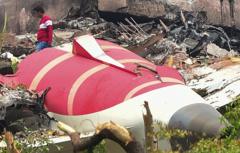**As investigators recover crucial data recorders, authorities weigh the options for analysis location while prioritizing safety and technical factors.**
**India's Decision Looms on Air India Crash Recorders Analysis**

**India's Decision Looms on Air India Crash Recorders Analysis**
**Flight data from the tragic Air India crash may go abroad for evaluation amidst safety concerns.**
India's Aircraft Accident Investigation Bureau (AAIB) is currently deliberating whether to send the flight data and cockpit voice recorders from the Air India flight crash to overseas experts for decoding and thorough analysis. The tragic incident, which took place last Thursday, resulted in the loss of at least 270 lives, primarily passengers, when the London-bound Boeing 787-8 Dreamliner went down shortly after taking off from Ahmedabad airport.
There were initial reports suggesting the black boxes would be sent out of the country, but the Ministry of Civil Aviation clarified that no final decision has been reached. The AAIB stated that the location for the analysis will be determined after considering technical, safety, and security aspects.
Investigators have successfully retrieved both units of Enhanced Airborne Flight Recorders (EAFRs), known as "black boxes," from the crash site. These devices, which record critical flight data and cockpit sounds, were recovered on June 13 and 16. The dual set-up aims to facilitate a robust investigation, as the recorders can track critical parameters such as gear positions, thrust settings, and engine performance.
Concerns have arisen, however, regarding the potential damage to the recorders due to a post-crash fire, raising doubts about their viability for data extraction in India. Some sources indicated that the government might consider sending the devices to the US for analysis. Captain Kishore Chinta, a former investigator with the AAIB, highlighted that a comparative analysis with the data downloaded in India could be beneficial if one recorder is sent to the National Transportation Safety Board (NTSB).
In related news, Air India's chairman announced that one engine on the crashed aircraft was newly installed, while the other was not scheduled for servicing until December. The airline stated that inspections on 26 out of its 33 Boeing 787-8 and 787-9 aircraft are complete, with all cleared for operational service. In response to the crash, India's aviation regulator ordered additional safety checks on the Boeing 787 fleet.
In light of these developments, Air India recently informed that they will reduce flights on 16 international routes and suspend services to three overseas destinations from June 21 to July 15. The adjustments are in line with voluntary safety checks and changes to accommodate altered flight durations due to airspace restrictions in the Middle East. This announcement follows the carrier's earlier decision to temporarily reduce operations utilizing wide-body planes by 15%.
There were initial reports suggesting the black boxes would be sent out of the country, but the Ministry of Civil Aviation clarified that no final decision has been reached. The AAIB stated that the location for the analysis will be determined after considering technical, safety, and security aspects.
Investigators have successfully retrieved both units of Enhanced Airborne Flight Recorders (EAFRs), known as "black boxes," from the crash site. These devices, which record critical flight data and cockpit sounds, were recovered on June 13 and 16. The dual set-up aims to facilitate a robust investigation, as the recorders can track critical parameters such as gear positions, thrust settings, and engine performance.
Concerns have arisen, however, regarding the potential damage to the recorders due to a post-crash fire, raising doubts about their viability for data extraction in India. Some sources indicated that the government might consider sending the devices to the US for analysis. Captain Kishore Chinta, a former investigator with the AAIB, highlighted that a comparative analysis with the data downloaded in India could be beneficial if one recorder is sent to the National Transportation Safety Board (NTSB).
In related news, Air India's chairman announced that one engine on the crashed aircraft was newly installed, while the other was not scheduled for servicing until December. The airline stated that inspections on 26 out of its 33 Boeing 787-8 and 787-9 aircraft are complete, with all cleared for operational service. In response to the crash, India's aviation regulator ordered additional safety checks on the Boeing 787 fleet.
In light of these developments, Air India recently informed that they will reduce flights on 16 international routes and suspend services to three overseas destinations from June 21 to July 15. The adjustments are in line with voluntary safety checks and changes to accommodate altered flight durations due to airspace restrictions in the Middle East. This announcement follows the carrier's earlier decision to temporarily reduce operations utilizing wide-body planes by 15%.






















